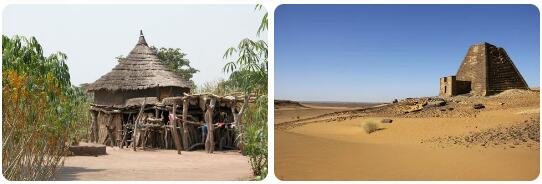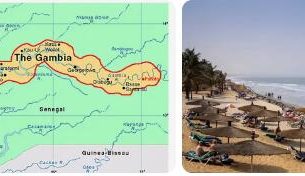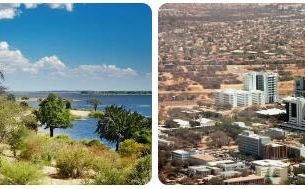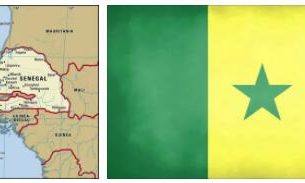Sudan – once Africa’s largest state
Sudan was once the largest country in Africa by area. In Southern Sudan, since 2005 an autonomous region of the country, a referendum was held in January 2011th In it, the majority of those who voted spoke in favor of the independence of the predominantly Christian region from Sudan.
The declaration of independence was then finally read out on July 9, 2011. Since then, South Sudan has been independent and Sudan is no longer the largest country in Africa, but has slipped into third place – behind Algeria and the Democratic Republic of the Congo.
Since Sudan’s independence in 1956, there have been repeated rebellions, for example in the southern provinces, against the Arabizing-Islamizing policies of the governments in the capital Khartoum. In 1983 a civil war began in which 2 million Sudanese lost their lives and 4.5 million were displaced. One must, however, keep in mind the reasons for the civil war. When the colonial rulers divided Africa among themselves, ethnic and/or religious affiliations were ignored. As far as Sudan is concerned, the completely different peoples of the north – predominantly Muslims (including Nubians and Arabs), who have much of their history and culture in common with the Egyptians – have been amalgamated with the predominantly Christian and animist-minded Bantu of the south.
Outside of conflict regions, you can travel very safely in Sudan. The Sudanese show a lot of respect and hospitality towards foreign travelers. Invitations to eat with locals or to stay with them are not uncommon. Nevertheless, you should definitely find out about the latest developments and the security situation at the Federal Foreign Office.
The country’s estimated 41 million residents are almost without exception Sunni Muslims. The Nile flows through Sudan. As in Egypt, of which the country was once a province, there are numerous archaeological sites on the banks of the Nile that bear witness to a culturally rich history. However, due to the political situation in the country, only one place made it onto the UNESCO World Heritage List; these are the “holy mountain” Barkal and the archaeological sites of the Napa region. You can see the remains of a temple dedicated to the Egyptian god Amun, a palace and pyramids.
| Name of the country | Republic of Sudan(Arabic جمهورية السودان,
Dschumhūriyyat as-Sūdān) |
| Form of government | Islamic Republic (de facto military regime) |
| Geographical location | Northeast Africa on the Red Sea |
| National anthem | Nahnu Djundulla Djundulwatan |
| Population | approx. 43.5 million (Credit: Countryaah: Sudan Population) |
| Ethnicities | approx. 50% Arabs50% African ethnic groups |
| Religions | Sunni Islam is the state religion in Sudan. |
| Languages | 50% Arabic50% African languages
English |
| Capital | Khartoum (Khartoum) |
| Surface | Approx. 1,886,000 km² |
| Highest mountain | Jebel Marra with a height of 3,042 m |
| Longest river | Nile with a length of 6,690 km |
| International license plate | SOU |
| National currency | (New) Sudanese pou |
| Time difference to CET | + 1h |
| International phone code | 00249 |
| Mains voltage, frequency | 240 volts and 50 hertz |
| Internet TDL (Top Level Domain) | .sd |
Sudan: history
Until around the year 1000
Between around 2500 and 1500 BC The kingdom of Kerma existed in the area of today’s Sudan, which extended to the southern border of Egypt and represented the oldest specifically African high culture. 2000 BC BC it was defeated by the pharaohs, the northern part of the country came between 1500 and 1000 BC. Under Egyptian influence.
According to Abbreviationfinder website, around 1000 BC, the kingdom of Kush with the later capital Meroe was founded in the 7th century BC. BC conquered the Egyptian Empire and established the 25th pharaoh dynasty. It existed until the 3rd century BC. BC and had a great wealth of gold and a strong military power.
From the year 1000 to the 19th century
The Christianization of Nubia began in the 4th century AD.
In 1315 the northern parts of the country were Islamized.
From 1504, after the collapse of the last Christian empire, Alwa, the spread of Islam also began in the south.
Between 1500 and 1800 the Arab tribes founded various Islamic sheikdoms such as the Fung Empire. At the end of the 18th century, Mohamed Ali conquered Sudan. Under the Egyptian rule, the region was mainly traded in slaves and gold.
A movement founded by the Sudanese religious leader Muhammad Ahmad (al-Mahdi) achieved the withdrawal of Egypt from Sudan by 1885. With British support, the Egyptians recaptured the country in 1898. During the Faschoda crisis in 1898 and 1899, Great Britain and France fought for supremacy in Sudan. After France renounced it in 1904, the area officially became an Anglo-Egyptian condominium, but was de facto a British colony. During this time, a Christian minority developed through missionary work in the south of the country.
Civil War in Sudan
In 1953, after elections under Ismai al-Aschari, an independent government was formed in the country. In 1955 the civil war began in Sudan between the Christian black south and the Islamic Arab north. On January 1, 1956, the country’s independence was proclaimed under President al-Ashari. In April Sudan joined the Arab League. After the elections in 1957, Abdallah Khalil (Umma Party) ruled the country for half a year.
In 1958 there was a military coup by General Abbud with the subsequent dissolution of parliament, suspension of the constitution and a ban on all parties. In 1964 the self-appointed head of state was replaced by a civil government under Al-Ashari. A period of political instability followed.
In 1969, after another coup, Colonel Jafar Muhammed an-Numeiri came to power. A socialist one-party system with the “Sudanese Socialist Union” (SSU) developed by Numeiri was introduced and foreign banks and companies were nationalized. In terms of foreign policy, the new government joined forces with the Soviet Union.
Another coup by left forces against the national revolutionary wing in 1971 was suppressed with Egyptian and Libyan help. Numeiri won the elections in October 1971.
In 1972, the insurrectionary south was granted autonomy status, an amnesty for the rebels and economic aid in the Addis Ababa Peace Agreement. In terms of foreign policy, the country opened up to the Federal Republic of Germany and the USA, while relations with the Soviet Union deteriorated increasingly.
In the new constitution of 1973, among other things, Islam was established as the state religion and the SSU as the sole state party. An autonomous government was formed in South Sudan.
After a failed coup attempt in 1976, Numeiri accused Libya of authorship and concluded an assistance agreement with Egypt.
In 1983 Islamic law (Sharia) was introduced in the country. In the same year, renewed uprisings began on the occasion of ethnic conflict in South Sudan after oil deposits were discovered in the region. The South Sudanese resistance fighters received logistical support from Ethiopia. Numeiri’s radical Islamization policy met with increasing opposition from both the majority of the population and in the National Assembly. In 1985 he was overthrown in a bloodless military coup.
The transitional government oriented itself more closely to Libya and the Soviet Union and also established diplomatic relations with Iran. The supply situation for the population, especially in the south of the country, continued to deteriorate dramatically.
After a military coup in 1989, the Islamic-oriented Umar Hasan Ahmad Al-Bashir took power. He banned the international aid organizations’ aid flights to the starving south.
After Osama bin Laden had to leave Saudi Arabia in 1992, he went to Sudan and from there directed the further development of the international terrorist organization Al-Qaeda. In the same year the government launched a large-scale offensive against the South Sudanese “Sudanese People’s Liberation Army” (SPLA).
Although the military dictatorship was officially ended in 1993, UN observers speak of genocide in the south of the country that was perpetrated jointly by radical Islamists and government troops. In 1998 the United States intervened in the conflict by bombing a chemical plant near Karthum, which allegedly produced poison gas. They also accused Sudan of being involved in the terrorist attacks in Nairobi and Dar as-Salam.
The civil war in the south of the country allegedly killed a quarter of a million people and another 2.5 million were affected by famine. In addition, there were increasing reports of an increasing slave trade in the region, which, according to this information, was being carried out by Arab-Muslim paramilitaries with unimaginable brutality. In 1999, following the dissolution of parliament by Al-Bashir, a state of emergency was imposed in Sudan. After the renewed ceasefire between the government and the rebels was broken, the aid organizations ended their aid flights. The 2001 new elections were blocked by the opposition parties and won by Al-Bashir.
Despite the ceasefire agreements in 2002, the conflict in Darfur in the west of the country escalated again in 2003. The government carried out massacres of the insurgent population as part of ethnic cleansing. Another famine followed. The government and the rebel organization SPLA signed a security agreement in October 2003 and a partial agreement in May 2004 on power-sharing and conflict settlement in four regions.
In January 2005, a peace agreement was signed that granted the south of the country partial autonomy for six years, followed by a referendum on secession.
epilogue
In May 2005, the UN Security Council referred the human rights violations committed by the Sudanese government and the Janjaweed militias it supported in Darfur to the International Criminal Court by resolution 1593 (2005).
The 21-year civil war in Sudan left around 2 million dead. One of the causes of war is the oil wealth of some southern provinces. While several states, including Great Britain, the USA and Germany, criticized the Sudanese government, others like Russia and the PRC, which are also interested in the oil concessions, prevented a more decisive approach. The UN at least reacted with great dismay through its Secretary General Kofi Annan.
On July 14, 2008, the Chief Prosecutor of the International Criminal Court (ICC) in The Hague requested an arrest warrant against the President of Sudan for genocide in Darfur, crimes against humanity and eight other charges. It is estimated that in Darfur around 300,000 people were killed by the Islamic equestrian militias by 2008 and that 2.5 million are on the run or live in camps.
Independence of South Sudan
In South Sudan, an autonomous region of the country since 2005, a referendum was held in January 2011. In it, the majority of the voters spoke out in favor of the independence of South Sudan from Sudan. The declaration of independence was then finally read out on July 9, 2011. Since then, South Sudan has been independent and Sudan is no longer the largest country in Africa, but has slipped into third place – behind Algeria and the Democratic Republic of the Congo.



